On a recent trip home to Coorg, once quiet country roads were jammed with traffic, there was a frenzy of ugly construction everywhere, and coffee estates were being carved up into plots on which to build villas, and sold to developers. And all the while, my social media feed continued to refer – incessantly, maddeningly – to Coorg as “the Scotland of India”. Never mind that the landscape and people are entirely different, that they have a beautiful culture and identity of their own. Never mind that the hills and valleys have their own songs, legends and stories to tell: but then, have you ever heard of a “Switzerland of England”? Or heard Venice called the “Alappuzha of the West”?
Under the circumstances, the kitchen seemed the best place to be, where comfort could still be found in a familiar pile of ingredients that behaved –generally – the way they were expected to. A handful of fresh, sharp scented coriander leaves and a few warm, whole spices set off an entire chain of thought that led to a fragrant dish of kaima undé curry. This is a rustic dish, comfort food of the best kind: spiced, gently poached meatballs suspended in a rich, layered curry that is practically a one-dish meal.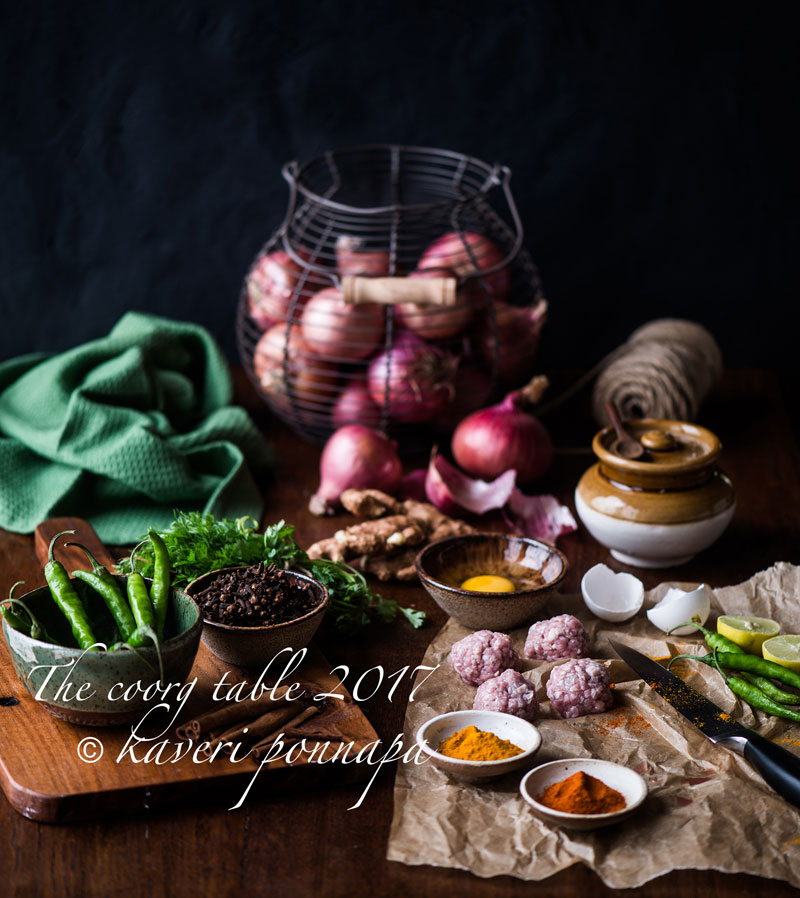
My hefty encyclopaedia of food history informs me that meatballs are one of the world’s favourite foods. Practically every corner of the globe has a much-loved version, made with an extraordinary range of flavourings and different meats. They can be deep fried, steamed, baked or poached; simmered in soups or sauces or just eaten by themselves, depending on cultural and culinary variations, but everywhere, this is comfort food. The Armenians have kufte rize, the Bulgarians ćufte. Estonians and the Finns have a version that is similar. You can work your way through several countries and cultures before you have exhausted all the versions of the meatball.
Kaima undé curry is rich and layered, with a nice touch of green spice to it that goes well with cold weather and steamed rice. Meatballs, both poached and fried are a favourite in the Coorg kitchen. Most of us have forgotten, but they are a link back to a time when hunting was a crucial part of life, when it was important to use every cut of meat without waste. A version of meatballs involving a stunning, deep, spicy pickle of minced boar or venison, poached, fried and filled to the brim into large jars with a blend of spices made its infrequent, but unforgettable appearance at the lunch table of my childhood. Since then, it has disappeared completely; but I get to hear of it now and then from women of another generation whose husbands hunted regularly, and who still cannot forget, after all these years, being woken up at odd hours of the night to make the most of the game that had been brought into their kitchens, cleaning and cooking until dawn broke.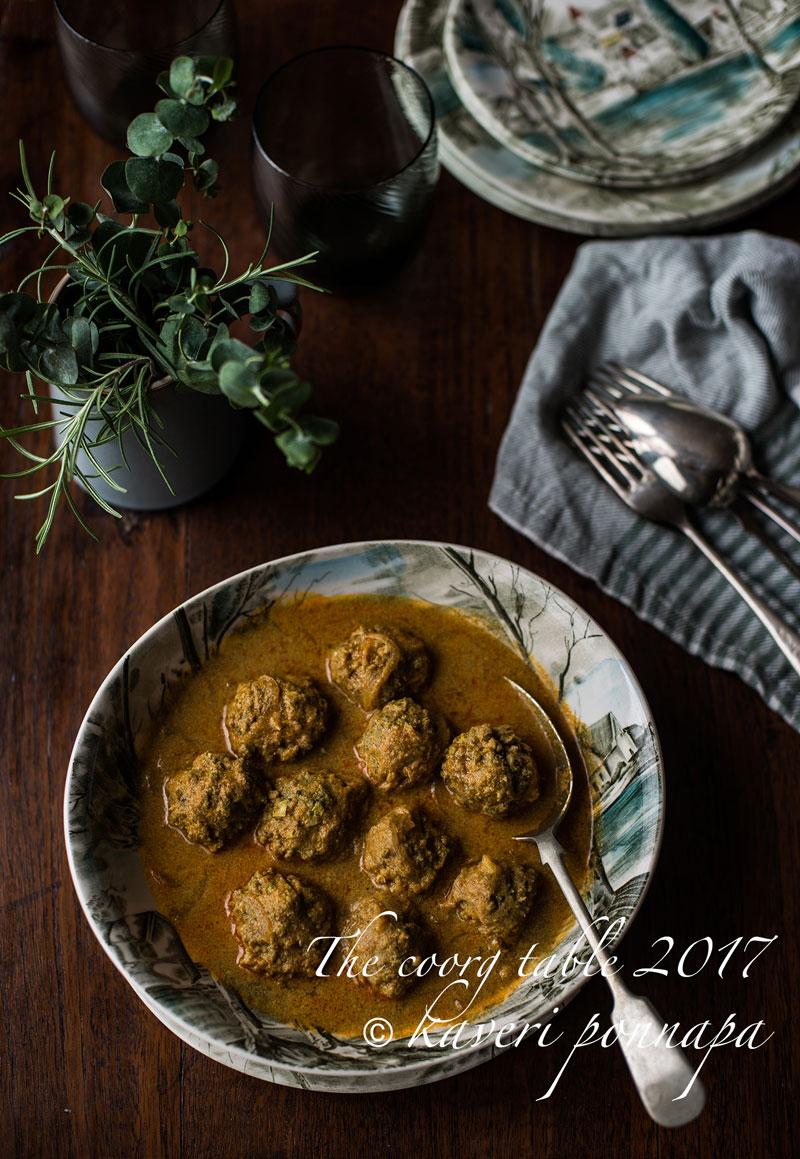
Some things we cook and eat are similar to what we find in other kitchens; they may be very close, but they are never the same. There are ingredients we include and others we leave out. Choices we make about textures, thickness, cooking times and garnishes: choices of when we eat a dish, and at which meal you will never find it on the table. Why, in one mouthful, there is a flash of recognition, a familiarity that brings immediate comfort, all of it tied up to time and place. So kaima undé curry will never taste like kufte rize, keftédes or any of the many delicious variations on the theme of meatballs cooked across the world, each of them perfect, each of them with a character of their own – in the same way that Coorg will always be Coorg, and never Scotland.
Photo Credits: Nithin Sagi
All Food Styling: Kaveri Ponnapa
Please look out for the recipe in my upcoming cookbook
Thank you for visiting this page. If you read something that you enjoy, or see an image that you like, please take a moment to write a response. Do look out for the recipes of all the food featured here in my upcoming cookbook.

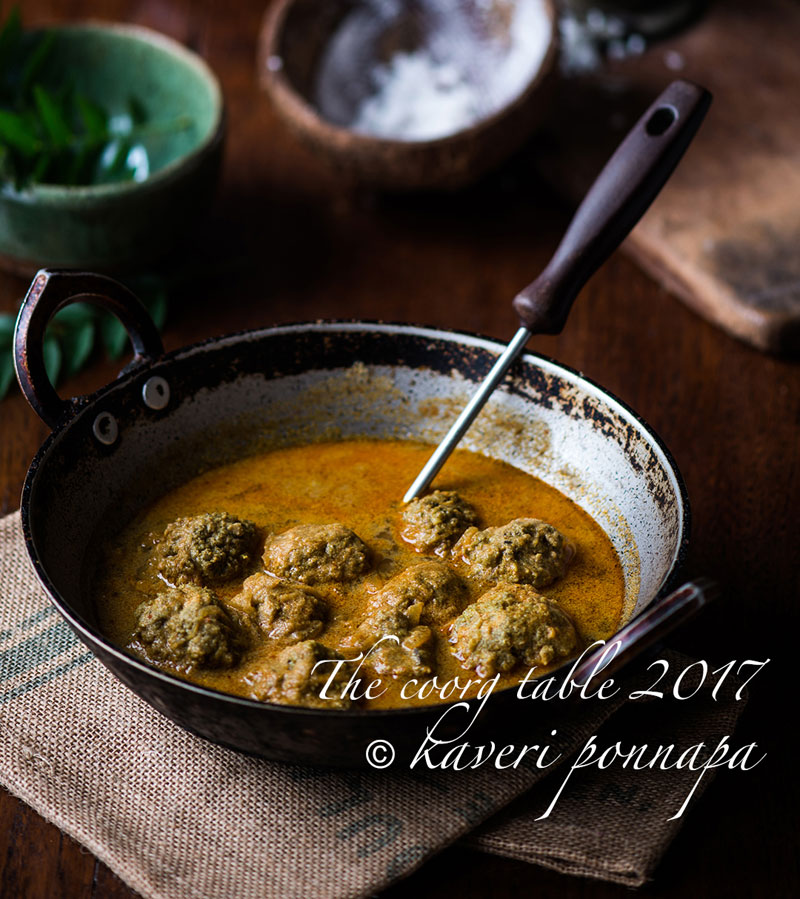
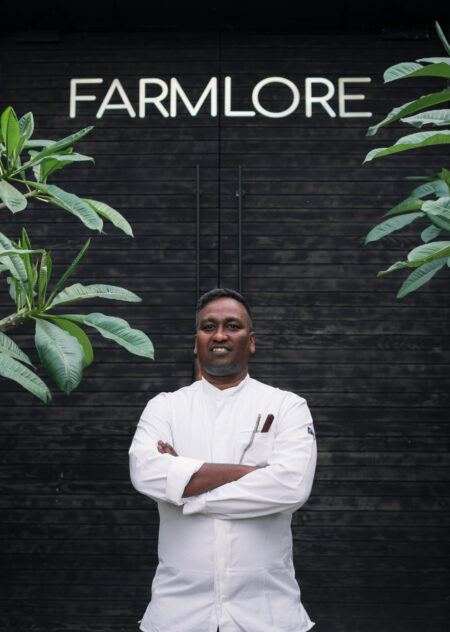
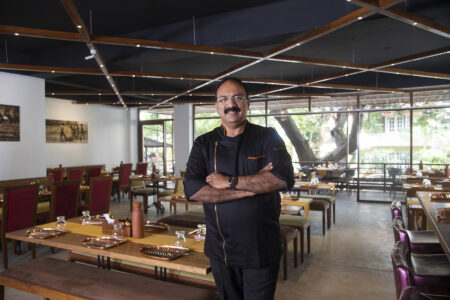
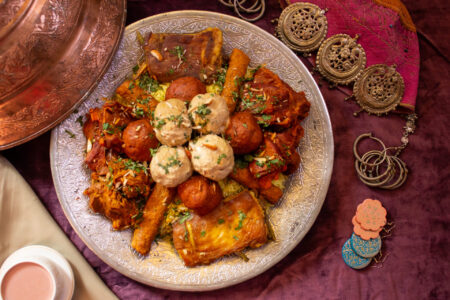
There are two places that I would love to spend summer vacations. One is Ooty and the other is Coorg. Growing up in Bangalore, our family used to visit MadiKeri. We visited General Kariappa”s house, which was more like a museum than a house. He was an illustrious personality who lived In a sprawling estate. I will never forget the rolling hills, the greenery and the food. The people of Coorg are the most handsome lot. It pains me to hear the landscape ruined by the developers and commercialized. I will eagerly await for your book.
Food and Travel Blogger.
Thank you for sharing your experiences of Coorg, Sundar Raj. Coorg, like almost every part of the country is reeling under the effects of ‘development’, and it will take a lot to save it. Documenting the food traditions of the place is one small way of keeping traditions relevant. I hope you will keep reading these pages,I will let you know when the book gets done. Best wishes.Kaveri
Dear Kaveri,
I have to tell you that aside from the fact that you are a prolific writer, you have a knack for styling. Food styling in all the images just shines through.. So very good co-ordination of props and colors.
Keep it coming..
Hello again, Radhika, and welcome back to these pages. Thank you very much for sharing your thoughts, and appreciation of this post. Life is just so busy for us all, so when people like you write, it makes me want to do even more. Food styling is a work of memory and imagination, as I am sure you have experienced, and I love my work. I hope that you will keep reading, and post a comment every now and then. Warm wishes. Kaveri.
Wonderful! Can’t wait for the cookbook! I have no doubt it will be a most prized possession, in a very short space of time!
Thank you Indira, for saying such generous things about this space. I do hope that the cookbook, when it is finally out, lives up to expectations. Do keep reading. Warm wishes. Kaveri
Had no idea Coorg had a version of meatball too ! I do believe that the Persian ‘kofta’ was the prototypal origin of the dish, with each culture making their own variation. I know there is an Anglo-Indian version and even a fish ball from Bengal ! Would love to try out the Kodagu version sometime.
I hope that you will be able to do that before too long,Kishore! I know that food historians trace the journey of the meatball from Persia to India, but I cannot believe that it did not exist here before the arrival of cooks and kings from that part of the world. Take Coorg for example-the traditional way of making a pickle of wild game was mincing the meat and shaping it into meatballs. This ensured that there was no wastage – meat was valuable – and also that you could use up the not so great cuts. Here’s another irresistible version from Coorg: https://kaveriponnapa.com/coorg-spicy-fried-meatballs.html best wishes.Kaveri
Hi. Waiting eagerly for your cookbook. Can’t wait for the pulikool, korierchi barthadh, kartha Palau, kaima unde curry..😃
Hi Thelma, all of these you’ve listed and much more, all ready to go 🙂 I know that you are going to enjoy every one of these as much as I do. I hope they will bring back beauitful food memories and stay with you for a long time to come. Do keep reading. Warm wishes.Kaveri
Hi, Nice to see you writing in blog after long time. A wonderful writing…waiting for your cook book eagerly. Thanks for all your wonderful posts…
Hello Kaverappa, yes, it has been a longish while since I posted on the blog. I think that it may be slow for a while, but I hope it will be worth it! I have now a nice collection of easy to make vegetarian recipes that I am sure you will like. Please keep reading, and I hope there will always be something that you enjoy on these pages. Warm wishes. Kaveri
Yes, pulikool is the word, I had forgotten the word.
I am sure both recipes will be tasty. Wish I could send u some kaipuli’s.
Looking forward for a blog on pulikool….
My granny used to cook kaima undai curry, that was the dish I used to finish in no time. The blog reminds me of the time when I used to have those sitting in the kitchen next to the firewood stove in the mansoon after a long day work of naati pani. Those were the days in Coorg which I will cherish till my last breath…
Thanks to your query, I looked through all my mother-in-law’s old recipes, and found two different recipes for pulikool paka that I have not made in years. Just waiting for a few kaipuli, and will be making some very soon.
Hi Kaveri, thank you for sharing this wonderful recipe. Growing up in madikeri we were fortunate enough to have all these authentic dishes not knowing that years later we would
be still craving for it ! Would be great if you could share the link to the recipe. I can read your blogs but never find the recipes . Thank you
Hello! That craving for old favourites never goes away, does it? All the recipes are going into a cookbook, and I hope that way you will have them all in one place, to refer to and cook from whenever you feel like, Monisha. In the meanwhile. some of my recipes are still up with the blog posts, I hope you’ll try them out. Best wishes. Kaveri